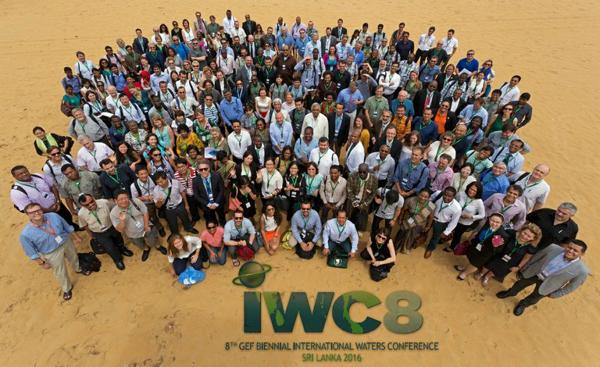IWC8

The GEF and the GEF International Waters Focal Area
The Global Environment Facility (GEF) (www.thegef.org) unites 183 member governments—in partnership with international institutions, non-governmental organizations, and the private sector—to address global environmental issues. An independent financial organization, the GEF provides grants to developing countries and countries with economies in transition, for projects related to biodiversity, climate change, international waters, land degradation, the ozone layer, and persistent organic pollutants. These projects benefit the global environment, linking local, national, and global environmental challenges and promoting sustainable livelihoods.
The GEF International Waters (IW) focal area targets transboundary water systems, such as shared river basins, lakes, groundwater and Large Marine Ecosystems. The cumulative 25-year GEF IW portfolio consists of 242 projects with about US$1.5 billion of GEF grants and $8.7 billion in co-finance invested in 170 GEF recipient countries. Since the inception of the GEF in 1991, the IW portfolio has delivered substantive results and replicable experiences to be scaled up and mainstreamed globally.
IWC8's Objectives and Theme
The GEF Biennial International Waters Conference (IWC) is the signature learning event for the GEF IW portfolio. The IWC objectives are to facilitate cross-sectoral and portfolio-wide learning and experience sharing. They strive to solicit advice from the existing GEF IW portfolio on burning issues, and to assist in building participant capacity in key management and technical areas. Participants sum up progress achieved and also look to the future of programming within and beyond the GEF IW focal area.
The IWC convenes about 300 participants, comprising GEF IW project managers, representatives of beneficiary countries, non-governmental organizations, transboundary management institutions, UN Agencies and the private sector. Collectively, the participants will represent about 90 active GEF IW projects, 80 countries and the various GEF Agencies. Participants are invited by the GEF Agencies implementing GEF IW projects.
The United Nations General Assembly’s adoption of the Sustainable Development Goals (SDGs) has set a new development agenda for the 2015 to 2030 period. While GEF IW investments directly or indirectly tie into each of the 17 SDGs and 168 targets, two SDGs—Ensure access to water and sanitation for all and Conserve and sustainably use the oceans, seas and marine resources—are of particular relevance to the GEF’s IW investments. With the new global development commitments in mind, IWC8 was organized under the theme Scaling Up Investments from Source to Sea in the Context of Achieving the SDGs, with learning tracks devoted to catalyzing transformation and scaling up investments; strengthening governance processes to sustain project interventions; and data to policy.
Conference Structure
IWC8 featured training sessions on key management and technical areas, such as the preparation of transboundary diagnostic analyses and strategic action programmes; gender mainstreaming; the water-energy-food-ecosystem nexus; project management; water diplomacy; economic valuation; areas beyond national jurisdiction; small island developing states; and conjunctive management. Technical site visits highlighted a range of water management challenges faced by Sri Lanka, and traditional and new approaches to combat these challenges. The technical site visit programme featured in-country tours to various GEF IW projects and non-GEF water management projects under implementation, and to private sector facilities. An evening event celebrated 25 years of GEF investments in IW.
Following the conference, an international roundtable, Partnering with the Private Sector for Sustainable Financing from Source to Sea, brought together a range of IW stakeholders to examine how IW partnerships between the private sector and countries, joint water management commissions, civil society, donors, marine management entities and regional organizations can be established. The international roundtable aimed to help coordinate efforts among UN Agencies, international financing institutions and NGOs toward a coherent and tangible approach to private sector engagement in source to sea management, as well as the interface of these actors with private sector companies, banks and other private actors for sustainable investments, with the new global development commitments in mind.
Important Dates
| Registration Opened | 15 March 2016 |
| Registration Closed | 29 April 2016 |
| IWC8 | 9-13 May 2016 |
| Technical Site Visits | 11 May 2016 |
| High-Level Segment | 13 May 2016 |
| GEF IW 25th Anniversary Celebration | 13 May 2016 |
| International Roundtable | 14-15 May 2016 |


























